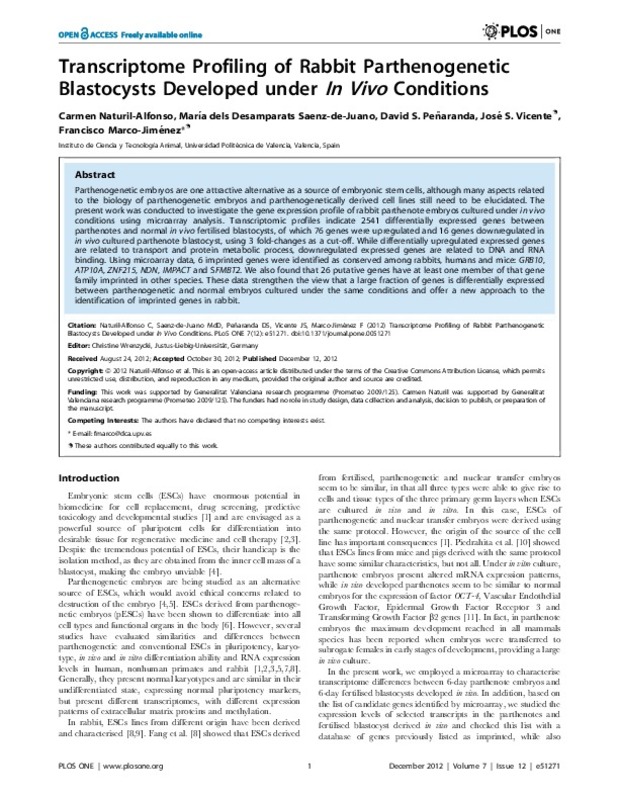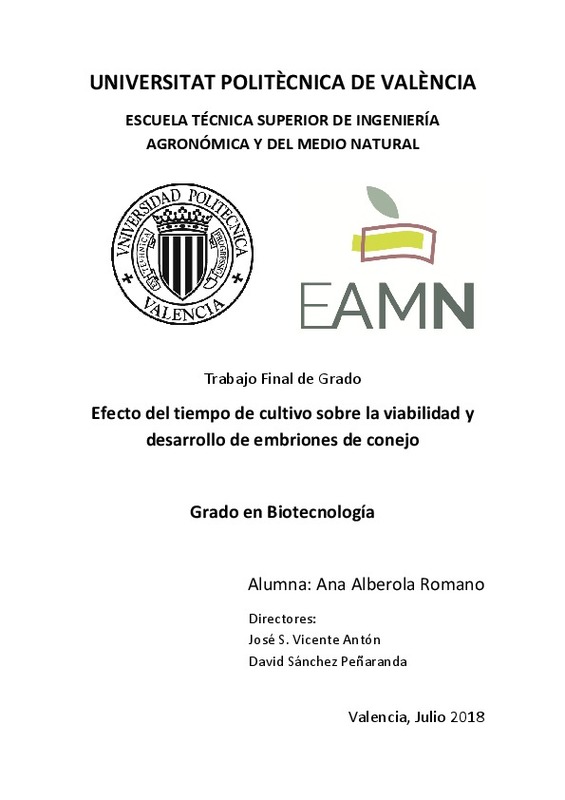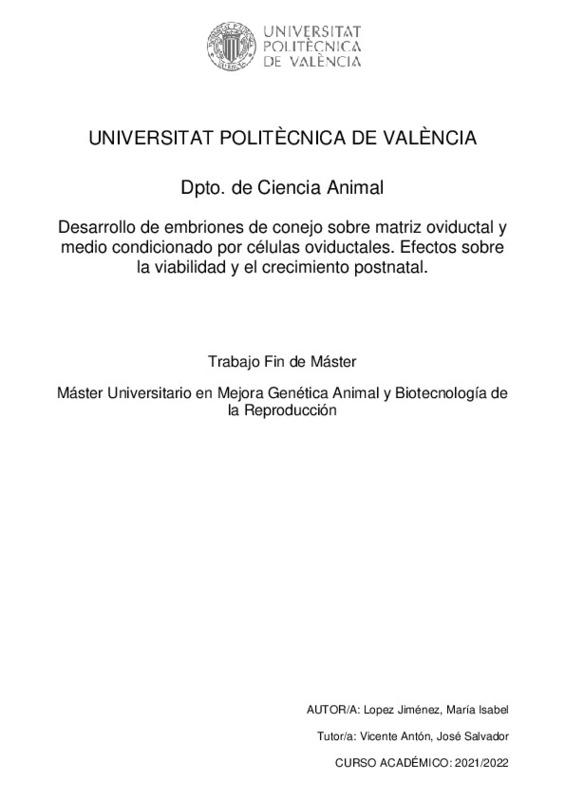Naturil Alfonso, C.; Saenz De Juano Ribes, MDLD.; Peñaranda, D.; Vicente Antón, JS.; Marco Jiménez, F. (2011). Parthenogenic blastocysts cultured under in vivo conditions exhibit proliferation and differentiation expression genes similar to those of normal embryos. Animal Reproduction Science. (127):222-228. https://doi.org/10.1016/j.anireprosci.2011.08.005
Por favor, use este identificador para citar o enlazar este ítem: http://hdl.handle.net/10251/38877
|
Título:
|
Parthenogenic blastocysts cultured under in vivo conditions exhibit proliferation and differentiation expression genes similar to those of normal embryos
|
|
Autor:
|
Naturil Alfonso, Carmen
Saenz de Juano Ribes, María de los Desamparados

 Peñaranda, D.S.
Peñaranda, D.S.

 Vicente Antón, José Salvador
Vicente Antón, José Salvador

 Marco Jiménez, Francisco
Marco Jiménez, Francisco
|
|
Entidad UPV:
|
Universitat Politècnica de València. Instituto de Ciencia y Tecnología Animal - Institut de Ciència i Tecnologia Animal
Universitat Politècnica de València. Departamento de Ciencia Animal - Departament de Ciència Animal
|
|
Fecha difusión:
|
|
|
Resumen:
|
Parthenote embryos offer multiple possibilities in biotechnological investigation, such as stem cell research. However, there is still a dearth of knowledge of this kind of embryo. In this study, development and ploidy ...[+]
Parthenote embryos offer multiple possibilities in biotechnological investigation, such as stem cell research. However, there is still a dearth of knowledge of this kind of embryo. In this study, development and ploidy were analysed in parthenotes under in vitro and in vivo culture conditions. Subsequently, using real-time PCR, the expressions of factor OCT-4, Vascular Endothelial Growth Factor, Epidermal Growth Factor Receptor 3 and Transforming Growth Factor ß2 genes were analysed to compare the embryo types at the blastocyst stage. Development and implantation of parthenote embryos were described after transfer at day 10 of pregnancy. Parthenotes showed similar blastocyst development for both culture conditions and most of the parthenotes produced were diploid. However, parthenotes developed under in vivo conditions showed similar mRNA expression of OCT-4, VEGF and TGF-ß2 to 5 and 6 day old blastocysts. In contrast, parthenotes developed under in vitro conditions had altered the expression pattern of these genes, except for erbB3 mRNA. Finally, transferred parthenotes had the ability to implant but showed severe growth retardation and lesser size. This is the first demonstration of the influence of culture conditions on parthenote mRNA expression. Our study highlights the importance of culture conditions in subsequent uses of parthenotes, such as the production of stem cell lines. © 2011 Elsevier B.V.
[-]
|
|
Palabras clave:
|
Culture conditions
,
In vitro
,
In vivo
,
MRNA expression
,
Animal
,
Animal embryo
,
Article
,
Blastocyst
,
Cell culture
,
Cell differentiation
,
Cell proliferation
,
Comparative study
,
Cytology
,
Embryo culture
,
Embryo development
,
Evaluation
,
Female
,
Gene expression
,
Gene expression profiling
,
Genetics
,
Metabolism
,
Nidation
,
Parthenogenesis
,
Physiology
,
Rabbit
,
Animals
,
Cells, Cultured
,
Embryo Culture Techniques
,
Embryo Implantation
,
Embryo, Mammalian
,
Embryonic Development
,
Rabbits
|
|
Derechos de uso:
|
Cerrado |
|
Fuente:
|
Animal Reproduction Science. (issn:
0378-4320
)
|
|
DOI:
|
10.1016/j.anireprosci.2011.08.005
|
|
Editorial:
|
Elsevier Masson
|
|
Código del Proyecto:
|
info:eu-repo/grantAgreement/MICINN//AGL2008-03274/ES/MEJORA GENETICA DEL CONEJO DE CARNE: REPRODUCCION, ESTRES Y LONGEVIDAD/
info:eu-repo/grantAgreement/GVA//PROMETEO%2F2009%2F125/ES/Efecto de la crioconservación de embriones sobre el desarrollo y el re-establecimiento de poblaciones/
|
|
Agradecimientos:
|
This work was supported by Generalitat Valenciana research program (Prometeo 2009-8260: 125) and by the Spanish Research Projects (CICYT AGL2008-03274). The authors thank Neil Macowan Language Services for revising the ...[+]
This work was supported by Generalitat Valenciana research program (Prometeo 2009-8260: 125) and by the Spanish Research Projects (CICYT AGL2008-03274). The authors thank Neil Macowan Language Services for revising the English version of the manuscript.
[-]
|
|
Tipo:
|
Artículo
|






![[Cerrado]](/themes/UPV/images/candado.png)





